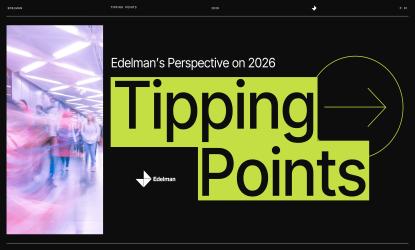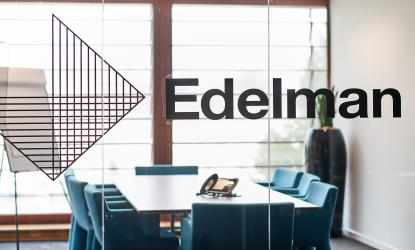- Global (EN)
- Africa (EN)
- Australia (EN)
- Belgium (EN)
- Brasil (PT)
- Canada (EN)
- Canada (FR)
- China (CN)
- France (FR)
- Germany (DE)
- Germany (EN)
- Hong Kong, China (EN)
- India (EN)
- Indonesia (EN)
- Ireland (EN)
- Italy (IT)
- Italy (EN)
- Japan (JP)
- Korea (KR)
- Latin America (ES)
- Malaysia (EN)
- Middle East (EN)
- Netherlands (EN)
- Spain (ES)
- UK (EN)
- Global (EN)
- Africa (EN)
- Australia (EN)
- Belgium (EN)
- Brasil (PT)
- Canada (EN)
- Canada (FR)
- China (CN)
- France (FR)
- Germany (DE)
- Germany (EN)
- Hong Kong, China (EN)
- India (EN)
- Indonesia (EN)
- Ireland (EN)
- Italy (IT)
- Italy (EN)
- Japan (JP)
- Korea (KR)
- Latin America (ES)
- Malaysia (EN)
- Middle East (EN)
- Netherlands (EN)
- Spain (ES)
- UK (EN)
Edelman's Gen Z Lab
Edelman’s Gen Z Lab is a dedicated advisory comprised of 250+ Edelman Gen Zers from around the globe designed and equipped to help brands future-proof their business for the next generation of consumers.
Find out more
Edelman’s Perspective on 2026: Tipping Points
Equip leaders to act by learning more about how 'equal and opposite reactions' are reshaping how people live, consume, connect, and engage with business in 2026.
Find out more
Edelman AI
Leveraging our extensive expertise in understanding the dynamics of trust—establishing, earning, and maintaining it— we empower organizations to effectively harness the potential of AI as a reliable and trust-building tool.
Find out more
2024 Edelman Trust Barometer: Special Report - Food and Beverage
The 2024 Edelman Trust Barometer shows a continued high level of trust in the overall F&B sector. However, that trust does not necessarily translate into all sub-sectors or into the industry innovations.
Find out more
Diversity, Equity & Inclusion
Discover how Edelman UK champions Diversity, Equity & Inclusion (DEI) through our people, policies and partnerships—driving meaningful change across our business and beyond.
Find out more
Anti-Slavery Statement
Read Edelman UK's Anti-Slavery and Human Trafficking Statement, outlining our commitment to ethical practices, transparency, and compliance with the UK Modern Slavery Act.
Find out more
Contact Us
Get in touch with Edelman UK. Whether you need strategic communications support, PR expertise, or digital marketing solutions, our team is here to help. Contact us today.
Find out more
Meet the Makers
We are a diverse team of brand, reputation, creative, research and digital strategists who drive award-winning creative communication programmes.
Find out more
Benefits & Policies
Discover the benefits and workplace policies at Edelman UK, including flexible working, wellbeing support, and inclusive initiatives that help our people thrive.
Find out more
Edelman’s Perspectives on 2025 Tipping Points
Equip leaders to act in 2025's high-stakes world by cutting through noise, spotting cultural tipping points, and navigating AI, politics, and polarization.
Find out more

